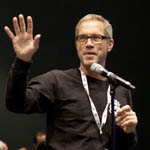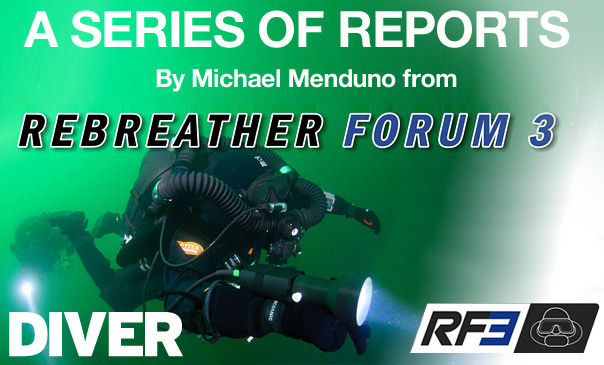Creating A Safety Culture
Third in series of reports on Rebreather Forum 3 by Michael Menduno.
Veteran explorers and educators Jill Heinerth and Terrence Tysell chaired an open discussion on training at the Rebreather Forum, encouraging participants to present views on a host of training related topics. In keeping with the RF3 theme, the conversation aimed at improving safety but instead of being centered on training, participants zeroed in on diving culture—what happens after training.
Currently, one of the biggest safety issues surrounding rebreathers is the fact that divers become complacent and don’t rigorously adhere to a pre-dive checklist in assembling and preparing their unit for diving as they (presumably) learned in class, and also neglect required post-dive maintenance. (Some experienced rebreather divers don’t follow checklists either.) Even worse, some divers choose to dive knowing that there are problems with their unit such as a faulty sensor or small leaks.
Methodically working through your rebreather’s checklist, which typically includes a five-minute pre-breathe, and only diving it if everything checks out, is the best way to ensure that the unit is functioning properly and to avoid any problems which could jeopardize safety during the dive. The use of checklists is standard in aviation, and is increasingly becoming so in medicine, because it saves lives.
Presenters saw the problem as an issue of creating a safety culture to support rebreather diving. Expedition leader and educator Richie Kohler made an impassioned, no-nonsense case for the use and efficacy of checklists in his presentation, “Failure Is NOT an Option: The Importance of Checklists.” During the presentation, Kohler put up a picture of eight close friends and mentors including his rebreather instructor, who lost their lives as a result of pilot error. “They were not fools,” explained Kohler, “but each of them made foolish mistakes and died as a result.” Checklists are designed to prevent such mistakes from occurring.
In another session, Heinerth presented her “Five Golden Rules” for rebreather diving, which included being properly trained and current for the dive you are about to conduct; following your checklist; pre-breathing your unit; making the decision to dive (responsibly), and being prepared to abort the dive safely with sufficient bailout gas. Heinerth told a story of being on a dive boat with five rebreather veterans. During her pre-breathe, she detected a small problem with her rebreather, and told the assembly she would be sitting out the dive, only to be pressured by the other divers to make the dive anyway. “It’s only a minor problem,” some opined, “You can still fly the unit manually.” To her credit, Heinerth didn’t back down.
As a community how do we encourage divers to do checklists and support their adoption within the culture? “Industry leaders need to become role models,” offered Heinerth. “We need to make it cool to do checklists.”
Heinerth, along with industry pioneers Dr. Richard Pyle, Database Coordinator for Natural Sciences at Bishop Museum; Kevin Gurr, CEO of VR Technology Ltd.; and others, are now spearheading an effort to create a set of best practices for rebreather diving dubbed “Blueprint For Survival 3.0,” referring to the original set of 10 safety principles for cave diving developed by legendary cave explorer Sheck Exley in his monograph, “Basic Cave Diving: A Blueprint for Survival.” The early tech community created a similar set consensus-standards for open circuit mix diving, “Blueprint for Survival 2.0,” which was published in the now defunct “aquaCORPS Journal.” More on this in the future.
 Writer and technologist Michael Menduno published and edited aquaCorps: The Journal for Technical Diving (1990-1996), which helped usher tech diving into the mainstream of sports diving, and coined the term “technical diving.” He also organized the first Tek, EuroTek and AsiaTek conferences, and Rebreather Forums 1.0 and 2.0. Menduno, who is based in Berkeley, CA remains an avid diver.
Writer and technologist Michael Menduno published and edited aquaCorps: The Journal for Technical Diving (1990-1996), which helped usher tech diving into the mainstream of sports diving, and coined the term “technical diving.” He also organized the first Tek, EuroTek and AsiaTek conferences, and Rebreather Forums 1.0 and 2.0. Menduno, who is based in Berkeley, CA remains an avid diver.
More from the forum:
Part 1
Part 2
Part 4
Part 5
Part 6
Leave a Comment








